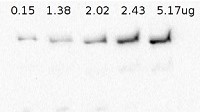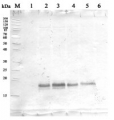1

Anti-EF-G1 | elongation factor G1
AS13 2652 | Clonality: Polyclonal | Host: Rabbit | Reactivity: Streptococcus pneumoniae, Synechocystis sp. PCC6803
- Product Info
-
Immunogen: Recombinant EF-G1 protein from Synechocystis sp. PCC6803, P28371, Cyanobase: slr1463
Host: Rabbit Clonality: Polyclonal Purity: Serum Format: Lyophilized Quantity: 50 µl Reconstitution: For reconstitution add 50 µl of sterile water Storage: Store lyophilized/reconstituted at -20°C; once reconstituted make aliquots to avoid repeated freeze-thaw cycles. Please remember to spin the tubes briefly prior to opening them to avoid any losses that might occur from material adhering to the cap or sides of the tube. Tested applications: Western blot (WB) Recommended dilution: 1 : 4000 (WB) Expected | apparent MW: 76.7 kDa - Reactivity
-
Confirmed reactivity: Streptococcus pneumoniae, Synechocystis sp. PCC6803 Predicted reactivity: Cyanobacteria, Nannochloropsis gaditana
Species of your interest not listed? Contact usNot reactive in: No confirmed exceptions from predicted reactivity are currently known - Application Examples
-
Application example

Left panel: from 0.15 to 5.17 µg of total protein from Synechocystis PCC6803 extracted with SDS-sample buffer and recombinant EF-G1 (right panel) were separated on 10 % SDS-PAGE and blotted 1h to PVDF. Blots were blocked with 5 % milk powder in TBS-T for 30 min. at room temperature (RT) with agitation. Blot was incubated in the primary antibody at a dilution of 1: 4 000 for 1h at RT with agitation. The antibody solution was decanted and the blot was rinsed briefly twice, then washed 3 times for 7 min in TBS-T at RT with agitation. Blot was incubated in secondary antibody (anti-rabbit IgG horse radish peroxidase conjugated) diluted to 1:10 000 in for 1h at RT with agitation. The blot was washed as above and developed for 5 min with ECL according to the manufacturer's instructions. Exposure time was 2 minutes.
Courtesy of Yichen Zhang, Department of Biochemistry and Molecular Biology, University of Massachusetts, USA - Background
-
Background: EF-G1 (elongation factor G1) is catalyzing the GTP-dependent ribosomal translocation step during translation elongation. Catalyzes the coordinated movement of the two tRNA molecules, the mRNA and conformational changes in the ribosome. Portein is located in cytoplasm.
- Product Citations
-
Selected references: Bárria et al. (2019). Pneumococcal RNase R globally impacts protein synthesis by regulating the amount of actively translating ribosomes. RNA Biol. 2019 Feb;16(2):211-219. doi: 10.1080/15476286.2018.1564616. - Reviews:
-
This product doesn't have any reviews.



